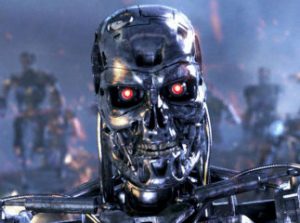Deskilling: A Slippery Slope to Skynet?
The nature of the election has left many of us with plenty of questions, concerns, and topics to complain about. I decided to take a break from writing during this time and avoid politics. In time I’ll probably find political topics of merit to discuss again. But, for now I’ve been thinking about jobs. Specifically, how deskilling has eliminated jobs in the past and may begin to again.
What’s That Mean?
Deskilling is essentially when technological advancements change the need for certain roles and skills in the workplace. Automation in factories is a good example of this. As robotics have advanced over the years we no longer have humans standing at every assembly line putting things together. But, we still have a lot of people in the service industry whose jobs could be replaced by automation. With workers wanting a higher minimum wage, companies have to ask themselves if they’d rather replace them with robots.
Here in Pennsylvania, and in neighboring states, we have Sheetz. For those of you who don’t know, these locations are gas stations that often offer made-to-order food as well. For many years the ordering process has been done by the customer on a touchscreen computer. Once the order is placed the employees make the food. Switching to this type of system in every fast food restaurant could substantially cut costs for companies. Naturally, the computers break down from time to time, which require people to work on them. Employees are also needed to make the food, but for how long? If automated assembly lines can build cars they can surely make my sandwich. The question is, is this kind of deskilling a good or bad thing? It could be good for companies in terms of cutting costs, but what about all of the people who would lose their jobs?
Enter Skynet

This guy is after your job.
Those developing this kind of automation live very different lives than those of minimum wage workers. They’re obviously educated and their work history surely reflects that. Many top minds in the field find advancements like self-driving cars to be exciting leaps into the future. However, do they stop and think about how that affects the economy? They may never have had to work for minimum wage. Why would they personally care if their projects put poor people out of work? Also, why would the companies they work for care? So long as they’re developing the latest technology and praying for government contracts most companies don’t care who they step on along the way. A bolder question yet – with the economy in the shape it’s in why are companies allowed to eliminate jobs? With the middle class already eroded shouldn’t there be measures in place to protect jobs from The Terminator?
Sure, robots need maintained and repaired. But that kind of work requires more training and possible certification than the job the robot’s taking. The self-checkout is nice and all, but why not at least leave Uber drivers alone? Now there’s a simple side job that many people do to make a little extra money. Isn’t the fact that Uber doesn’t even need to provide the vehicle enough? They now want to cut the drivers out of the equation? How about we suspend all job-eliminating projects until unemployment is below a certain level? Or is that too “socialist” to even consider? See how much you like capitalism when the T-1000 is driving your Uber and living in your house while you eat out of the dumpster.




